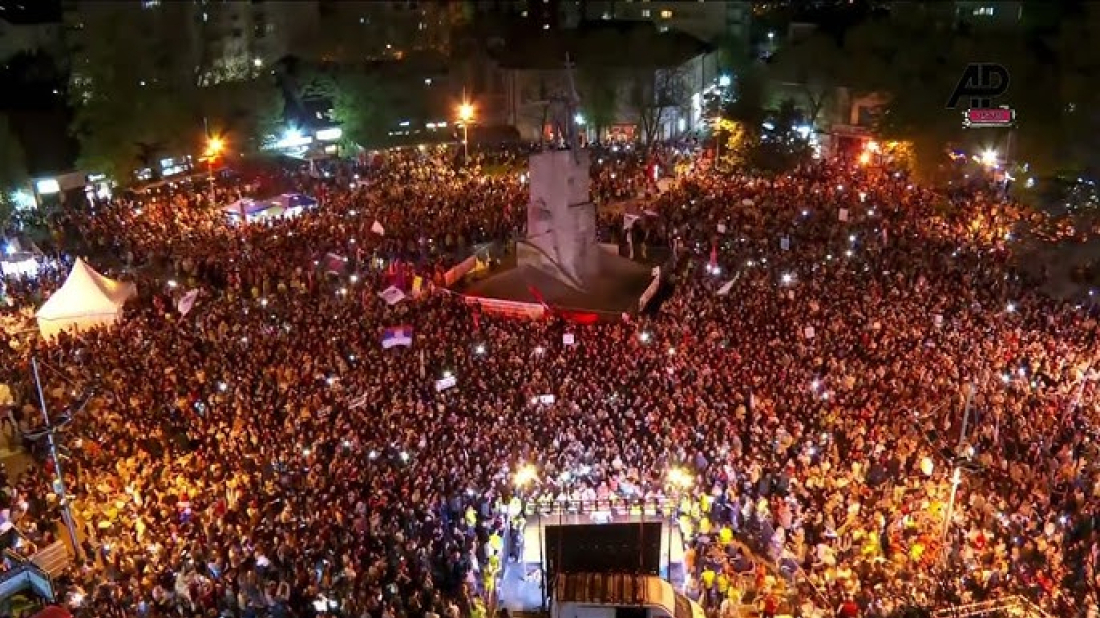U.S.-Israeli strikes on Iran: What we know so far
The United States and Israel have carried out large-scale strikes on Iranian leadership and military targets, with Iranian state media confirming t...

Following the tragic incident at the Novi Sad railway station, student-led protests in Serbia have turned into the most serious public outcry against the government — a new prime minister has been appointed, while allegations of sound weapon use have been officially denied.
The ongoing student-led protests in Serbia have become the most significant public pressure on President Aleksandar Vučić’s administration in recent years.
On Wednesday, thousands of students and their supporters gathered in the city of Kraljevo for the latest demonstration. Protesters turned on the flashlights of their mobile phones to observe a minute of silence for the victims of the Novi Sad train station collapse, before continuing the march with music and flame effects.
The protests were sparked by the tragic incident last November, when the roof of the Novi Sad railway station collapsed, killing 16 people. The event reignited public outrage over widespread corruption and government negligence.
Political Newcomer Appointed as Prime Minister
Amid the unrest, the Serbian Parliament approved Djuro Macut, a medical professor with no political background, as the country’s new prime minister. His predecessor, Miloš Vučević, resigned under pressure from the protests.
The new cabinet will consist of 31 ministers, 22 of whom served in the previous administration. While opposition parties demanded a transitional government until the 2027 elections, the ruling Serbian Progressive Party (SNS) rejected the proposal.
Sonic Weapon Scandal and Official Denial
During the March protests in Belgrade, some demonstrators claimed the police used sonic weapons. The European Union and human rights groups called for an investigation, prompting Serbian authorities to invite Russia’s Federal Security Service (FSB) to examine the matter.
At a press conference on Wednesday, President Vučić shared the findings of the FSB’s investigation, which concluded that Serbian police did not use sonic weapons during the protests.
“This was all premeditated. It’s part of an ongoing information and psychological warfare against Serbia,” Vučić said.
However, Interior Minister Ivica Dačić admitted that in 2021, Serbia had acquired Long-Range Acoustic Devices (LRADs) from the United States, claiming they were intended solely for public announcements.
Expert groups stated that evidence around the use of sonic devices remains inconclusive, but did not rule out the possible use of LRADs or experimental vortex cannons.
What’s Next for the Protests?
The daily student-led demonstrations show no signs of slowing. Analysts consider the movement the most significant civic uprising during Vučić’s political career, which began in 2013. Both domestic and international observers continue to monitor the developments closely.
Follow the latest developments and global reaction after the U.S. and Israel launched “major combat operations” in Iran, prompting retaliation from Tehran.
Governments across the region responded swiftly to Israel’s strikes on Iran, closing airspace, issuing travel advisories and activating contingency plans amid fears of escalation.
Ayatollah Alireza Arafi has moved into a pivotal constitutional role following the death of Supreme Leader Ayatollah Ali Khamenei, becoming the clerical member of Iran’s temporary leadership council under Article 111 of the Constitution of the Islamic Republic of Iran.
A senior Iranian official has warned Israel to “prepare for what is coming”, insisting that Tehran’s response to the latest escalation in the Middle East will be made openly and without limits.
Ayatollah Ali Khamenei, Iran’s supreme leader for 36 years and the country’s highest political and religious authority, has died aged 86 following joint Israeli and U.S. strikes on his compound in Tehran.
Protests broke out in Pakistan and Iraq on Sunday after Iranian state media confirmed that Supreme Leader Ayatollah Ali Khamenei had been killed in joint U.S.–Israeli strikes. At least nine people were reported dead in clashes near the U.S. consulate in Karachi.
Afghanistan said it had fired at Pakistani aircraft over Kabul after explosions and gunfire rocked the capital early on Sunday, marking a sharp escalation in fighting between the two neighbours.
A senior Iranian official has warned Israel to “prepare for what is coming”, insisting that Tehran’s response to the latest escalation in the Middle East will be made openly and without limits.
Cuba has released extensive details of a deadly midweek shootout at sea, showing rifles, pistols and nearly 13,000 rounds of ammunition that it says were carried by a group of exiles who attempted to enter the island by speedboat.
Afghanistan’s Taliban rulers said on Friday (27 February) they were ready to negotiate after Pakistan bombed their forces in several Afghan cities, including Kabul and Kandahar, and Islamabad declared the neighbours were now in "open war".
You can download the AnewZ application from Play Store and the App Store.

What is your opinion on this topic?
Leave the first comment